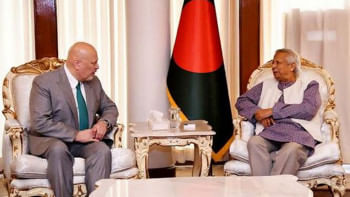The Philosophy of a Local Bus Trip to Teknaf

“A journey is like marriage. The certain way to be wrong is to think you control it,” wrote American author John Steinbeck. What would the great philosophers of journey think of a local bus trip to Teknaf?
Cox's Bazar bus station: I don't choose the bus to Teknaf. It chooses me. I'm hustled aboard by youths who demand ticket cash. In any other country it'd be a scam. As they run away with my cash I wonder if I'll see their overworked faces again.
As could only happen here they soon return with my ticket. At first I suspect they've stashed commission in the fare but no, the rate is exact. When will you stop doubting?
“The question is not what you look at, but what you see,” wrote travel writer Henry David Thoreau.
The bus is small, the company nameless. It's painted in a soothing tropical motif in pineapple tones and there's a sign: “Non-stop Special Service.” I can't imagine how special it'll be.
“I like this place, and willingly could waste my time in it,” wrote William Shakespeare.
The bus sits and sits. We bake and bake. More people are cajoled aboard. Finally, we move!
But not far: just beyond is the Teknaf turn-off. It's a lovely spot with mud to get semi-bogged on a dry day. Traffic hovers. We're irretrievably parked in.
“The world is a book and those who do not travel read only a page,” wrote St Augustine.
Teknaf must be a town of readers. Why else is that man yelling negotiations for thirty minutes, to load three enormous sacks of books? They can barely lift those bundles: the bus squats in pain.
With horns blasting, snack sellers aisle-squeezing and more seat-less passengers boarding book negotiations finalise. It's time to leave. It's hard to breathe. The first two kilometres hold promise. But promise ends with a bang! An excess of literature has busted the engine, irreparably.
Standing in the roadside sun… a replacement bus will come, they say. Does the pineapple-themed company have a replacement bus?
The passengers have strong views about literature now. They're yelling at the book businessman. After forty minutes a second bus arrives; only they filled it with new passengers before they left.
Elbow and shove, people are piling inside, claiming a centimetre of new-bus space though it started out full. My jostling skills aren't up to it and I played rugby at school.
Fortunately the conductor tells me to wait. He'll find a seat where there are none.
“It's so nice to know where you're going, in the early stages. It almost rids you of the wish to go there,” wrote playwright Samuel Beckett.
There's yelling and manhandling. Ultimately the conductor hustles a seat and I'm ushered inside.
The man beside me is the same as previously. “This is my sitting friend from before,” he says.
Twenty kilometres and the bus stops again, the road blocked. Another bus is dangling precariously, one back wheel hovering over a gargantuan road works hole. Its passengers have escaped without the bus toppling. There's a crowd.
They'll use a plank to ford the hole; with bus wheel hopefully balancing it until finding solid ground. Locals choose the best log they can. It looks a bit thin. If they did this in a stadium people would buy tickets. It's a daredevil stunt, an action film.
The other driver puts foot to pedal. Bus bursts forward with back wheel walking the plank. Just inches behind, the plank is splitting; in the nick of time it reaches the far side. Macgyver would be proud.
“Travelling – It leaves you speechless, then turns you into a storyteller,” wrote Ibn Battuta.
The conductor's a few rows up. “If you are going to vomit use a polythene bag!” he's saying. It's said three times and thrice said can't be good.
Passengers wish to alight: yes, a non-stop service but it'll only take a moment… In Bangladesh everything is personalised.
A passenger wants cargo from the roof: I'm not sure if the bag broke but clouds of anger gather. The driver fears for his vehicle so pulls out leaving the conductor to face the brouhaha. Some hundred metres on… the conductor, at a run, reboards. His belt buckle is broken, shirt torn. There's post-punch-up relief in his face. The scenery is stunning: the Naf River and grainy Teknaf range.
Stop-start, stop-start… eventually we arrive.
“Though the road's been rocky it sure feels good to me,” wrote musician Bob Marley.
The conductor shakes my hand enthusiastically, seemingly happy to have survived. To think, he does this every day.


 For all latest news, follow The Daily Star's Google News channel.
For all latest news, follow The Daily Star's Google News channel. 



Comments